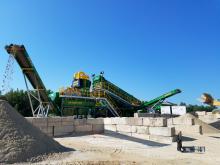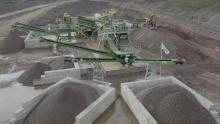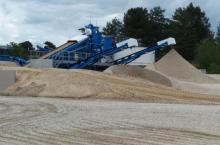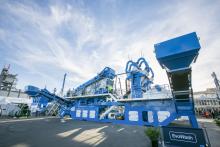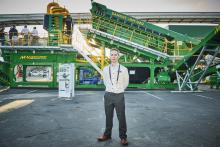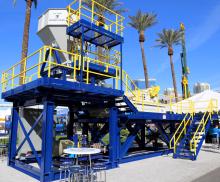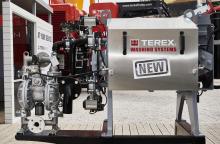The showcasing of new plants and major installations for key global customers is making for a lively aggregates washing solution sector. Guy Woodford reports.
The AggreSand 165 three-deck, two-sand processing plant was up and running and producing quality product after just five days.
Blake Sand & Gravel has been providing quality sand and gravel products since 1953, and its primary products are aggregates for ready-mix concrete, sand and washed rock.
It wanted to replace an existing wash plant to achieve a higher production capacity due to increased demand because the old plant, which produced 75tonnes/hour, required intensive labour for cleaning ponds along with high running costs.
The decision was taken to invest in a new innovative solution that would ultimately achieve a higher efficiency to maximise its yield.
“This has certainly been achieved with the new AggreSand 165 washing plant,” says owner Dave Blake.
“Instantly we are using 20% less electricity, substantially reducing our running costs. We have increased our feed by 50%, enabling us to supply to demand, and the added benefits from the AggreSand gives us the ability to blend materials for specific grades and we have a much more effective fine sand recovery (halving the frequency of pond clear outs), which further reduces our running costs and increases yield by reducing the losses of material to the ponds.”
The AggreSand plant is processing natural sand and gravel (glacial till) to produce a coarse concrete aggregate and fine concrete sand (C33 spec), which is also being sold for septic sand and equestrian sand.
“When we were considering purchasing a wash plant, we were keen to find a solution that would achieve the efficiencies outlined above, as well as a seamless easy set-up, something with a reduced footprint and the capability of producing two grades of sand,” says Blake.
“The AggreSand ticked all those boxes and more. The plant arrived on our site on a Monday and by Friday we were producing quality product on the ground.”
TWS distributor in Washington,
This involved several site visits, feed material analysis, plant drawings and design modifications to suit the required specification.
Samples of the feed material were sent for further testing at TWS headquarters in Dungannon, Northern Ireland, and a full civils and plant layout drawing was provided, outlining the water and electrical input/output points.
“The expertise and support we received from TWS and Powerscreen Washington, has been second to none, making the entire process easy,” says Blake.
“The plant has been producing effectively since it was installed. The HMI control system was a feature that really appealed to me. The ability and ease of obtaining live data in terms of water pressures, flows, cyclone feed pressures as well as motor amp reading was very impressive.
“Undoubtedly the AggreSand 165 with its 16x5 screen will leave Blake Sand & Gravel in a strong position to meet current demand and keep up with our ambitious growth plans.”
The plant is producing five clean products 22mm-50mm; 11mm-22mm; 5.5mm-11mm and two sand fractions.
Meanwhile,
The modular wash plant ranges, SandStorm 516 and 620, have been successfully commissioned in Chicago, Illinois and Deer Lake, Newfoundland, with three additional SandStorm 620 plants being assembled between now and January 2018 in Colorado and Texas.
The SandStorm modular plant can efficiently process feeds up to 550tonnes/hour, with up to three grades of aggregates and two grades of classified sand.
The company says the MWS mobile wash plant, consisting of a tracked S190 or S130 (two-deck or three-deck) rinser feeding a single or twin sand screw, has been a popular plant with operations looking to get a clean stone product and dewater the sand in an easily managed way.
The new McCloskey Scavenger static wash plant was delivered recently to Kitchener, Ontario, Canada, and is said to provide maximum performance in recovering sand losses from a screw washer and reducing sand tonnage to the ponds.
“We’ve had a busy year of new product development and it’s gratifying to receive such positive feedback on our efforts,” says Craig Rautiola, MWS technical sales and applications manager.
“We place a lot of emphasis on listening to what our customers’ requirements are, and judging by the feedback that we have received on the new product launches, we are definitely on the right track with our new product development initiatives.”
Sean Loughran, director of McCloskey Washing Systems, says: “It’s been an excellent twelve months for MWS and we are delighted with the growth we are making. We have designed and delivered a successful product range and we plan to unveil many new products in 2018.”
Following the huge success of its recent first UK open day, MWS says it is planning to host another UK exclusive open day event in London at the beginning of 2018.
The company says the open day highlighted new washing and classifying equipment for quarrying and recycling applications.
The event was held at the Nuneaton, county Warwickshire, England, facility of leading recycling company Crown Aggregates, which has taken delivery of the first new McCloskey wash plant in the UK, supplied by Max Innovate, MWS dealer for the UK.
Fintan McKeever, managing director at Max Innovate, said: “The wash plants provide Crown Aggregates with clean in-specification material that they could not achieve by dry screening: this will increase their sales and grow their customer base.”
MWS hosted a live working demonstration of the SandStorm 516 and AggStorm 150 working in tandem as a shared solution. Together, they process quarry scalpings with a high clay content to produce three aggregates and two sand products.
The open day marked the launch of the new AggStorm 80 and 150 modular log washer range, which is designed to operate as stand-alone units or to integrate with the SandStorm range of wash plants.
In this application, the customer is making 10mm, 20mm and 40mm aggregate, while the SandStorm 516 is producing 0-2 and 0-5mm grades of sand while producing plus 40mm rinsed stone.
Ben Frettsome, MWS sales and applications manager said: “Reaction to the plant was exceptional and we received immediate orders as a result. Customers walked around the machines, watched them in action in a demonstration show and discussed the features and benefits.”
Michael Honea, process engineer at
“Continued drought conditions prompted local [North America] governments to implement water-usage limitations, pushing aggregate producers to use new technology to stay within those boundaries,” says Honea.
“When it’s time to upgrade or choose new washing equipment, take into account operating costs and features that contribute to a sustainable and profitable jobsite. This includes the machine’s energy expense, water usage, maintenance and processing time. Develop an understanding of these factors and, before long, you’ll be on your way to a more sustainable jobsite.”

